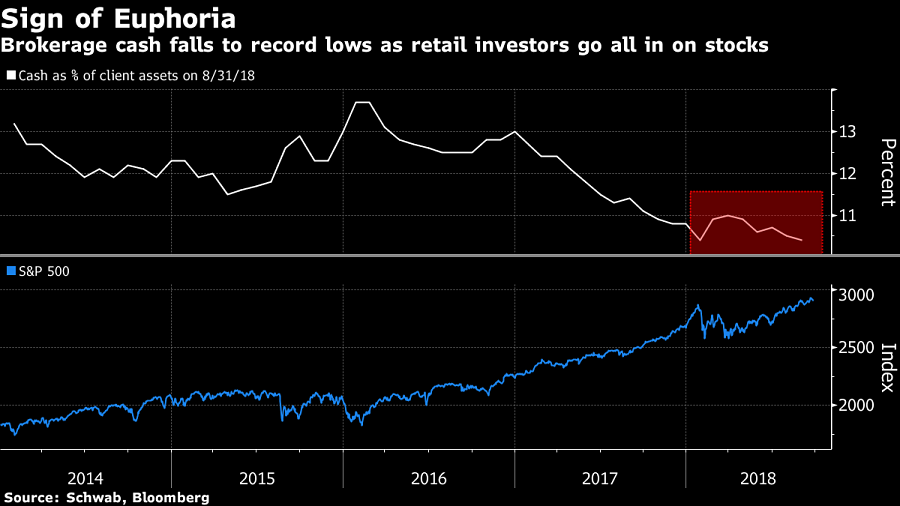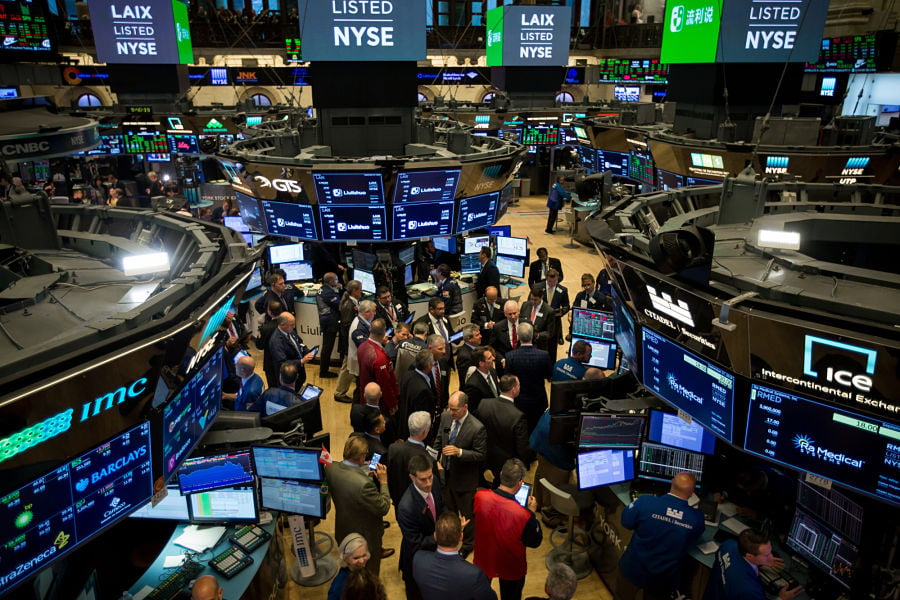U.S. stocks delivered the best quarterly run in almost five years, luring retail investors back into the longest bull market on record just as Wall Street started sounding the alarms.
Individual investors drew down cash balances at brokerage accounts to record lows as the S&P 500 surged 7.2% in the three months ended Friday. Meanwhile, big banks from Morgan Stanley to JPMorgan recommended curbing investments in American stocks, with strategists forecasting the second-weakest year-end period of the nine-year run.
The conflicting views partly reflect a different approach to the market. While individuals tend to chase stock performance, professional prognosticators are growing cautious amid forecasts that profit growth will slow along with the pace of economic expansion. To David Campbell, a principal of BOS, which oversees $4.5 billion, the lack of consensus is good news for American stocks.
"I don't really worry about markets when there is a lot of skepticism. I worry about markets when I don't see anybody being skeptical," Mr. Campbell said by phone. "The longer bull markets go, the more people who have been sitting on the sideline feel like they're missing out. So there is built-up pressure to give in and participate."
Retail investors poured into the market as stocks eked out a sixth straight monthly gain to cap a quarter that saw all major benchmarks reach records amid a surging economy and booming profits. The S&P 500's gain was the best since 2013, while the Dow Jones Industrial Average jumped 9% and the Nasdaq 100 Index increased 8.3%.
Cash as a percentage of assets among Charles Schwab Corp. clients in August fell to 10.4%, matching the level in January that marked the lowest since at least 2004. Eight months ago, the S&P 500 suffered its worst correction in two years, sparking fears of a repeat. A distinction now is that optimism is not as widely shared as it was then, when Wall Street strategists rushed to raise their forecasts after President Donald Trump's tax overhaul and hedge funds amped up borrowing to bet on stocks.
Now strategists, normally among the most bullish of cohorts, look almost timid. Based on the average year-end S&P 500 target of 2,956, they predict just a 1.4% gain in the fourth quarter. That would be the worst close to a year since 2012.

Alarms are ringing at firms from Goldman Sachs to Citigroup as strategists warned over peaking growth, trade tensions and stretched valuations. Earlier this month, hedge fund clients at Morgan Stanley reduced their leverage to the lowest level this year, a sign that risk appetite is retreating.
(More: Seeking small-cap value in a momentum-driven market)
Brian Belski at BMO Capital Markets is sticking to his year-end target of 2,950 for the S&P 500 amid concern that investors may have flocked to stocks in anticipation of a year-end rally that could be delayed by the political turmoil in Washington and the midterm elections.
"Given the strong momentum of U.S. stocks, many clients have asked why we have not become more optimistic," Mr. Belski wrote in a note Thursday. "We believe investors may have already 'pulled forward' any anticipated post-midterm election bump."
In midterm years going back to World War II, stocks tended to start the year slowly before rallying in the final quarter. The final three months have delivered on average gains twice as big as those in non-midterm years. The S&P 500 has rallied 9% from January to September this year, compared with an average loss of 1.7% at this time in midterm election years.https://cdn-res.keymedia.com/investmentnews/uploads/assets/graphics src="/wp-content/uploads2018/10/CI117326101.PNG"
With earnings forecasts still on the rise and the Federal Reserve in no hurry to slow the pace of tightening, the market is unlikely to repeat the same pace of gains in coming months, according to John Augustine, chief investment officer who helps oversee $17 billion at Huntington Private Bank.
Contrary to the past, when profit estimates fell during the course of a year, analysts have kept ratcheting up their forecasts for 2018. While the upgrades reflected Mr. Trump's tax cuts, they set a higher bar for companies to clear.
And stocks are not cheap. At 16.8 times forecast earnings, the S&P 500 traded at a multiple that's 14% higher than its 10-year average.
"We're probably seeing the peaking moment in the economy and earnings growth," Mr. Augustine said. "Does it mean markets deteriorate? No. But stocks probably have done their bulk of work this year."
(More: Advisers warn against fleeing stocks in favor of bonds)








